Coursera is legit and accredited, but with important nuances.
While Coursera itself isn’t an accredited university, it partners with globally recognized institutions to deliver Coursera accredited certificates, degree programs, and professional credentials.
So, are Coursera courses accredited? Yes, many are, depending on the partner institution.
This article breaks down Coursera accreditation, employer recognition, job value, and industry relevance, while comparing Coursera certificates across regions.
Key Takeaways: Is Coursera Accredited?
- Coursera is accredited!
- Accreditation is a key factor in online education, and Coursera addresses this by offering programs in collaboration with recognized institutions.
- Through these collaborations, learners gain access to Coursera accredited certificates that carry weight in professional and academic settings.
- Depending on their relevance and industry recognition, Coursera’s courses may aid in career advancement.
Understanding Accreditation
Accreditation is a formal recognition process ensuring educational programs meet certain quality standards. Institutions and their academic offerings must achieve and maintain such status.
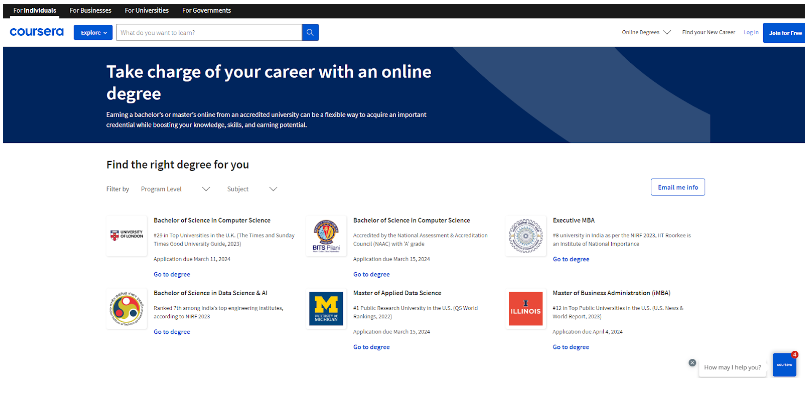
The Definition of Accreditation
Accreditation is an evaluation by an authoritative body that validates whether an educational institution or program meets established standards of quality and effectiveness. When an institution is accredited, it demonstrates a commitment to ongoing improvement and providing a high level of education.
Types Of Accreditation
There are primarily two main types of accreditation that determine whether are Coursera certificates accredited:
- Institutional Accreditation: This applies to the entire institution, indicating that each aspect of the institution’s operation meets certain criteria of excellence.
- Programmatic or Specialized Accreditation: This is specific to individual programs, departments, or schools that are part of a larger institution, often associated with particular disciplines.
Is Coursera Accredited?
Coursera is not an accredited institution itself, but it partners with accredited universities and companies to offer courses and credentials. Understanding the accreditation status of the courses and degrees offered through Coursera is essential for potential students.
Coursera’s Institutional Recognition
It’s important to note that Coursera is a platform for learning rather than an accredited educational institution. As such, Coursera does not independently confer accredited degrees or certificates.
However, they provide access to course content from many globally recognized universities and institutions that may offer accredited programs.
Partnerships With Accredited Institutions
Coursera collaborates with numerous accredited universities to offer a range of courses and degree programs.
These partnerships mean that while Coursera facilitates the online platform, the accreditation for the degrees or professional certificates comes directly from these established institutions.
Some of Coursera’s offerings include professional certificates and bachelor’s and master’s degrees from institutions that possess regional, national, or international accreditation.
Overview Of Coursera
Coursera provides various online courses, specializations, and degrees from universities and companies worldwide. The platform is known for its partnerships with top-tier institutions and its commitment to offering accessible education.
If you want to know what Coursera Plus offers, then check our in-depth Coursera Plus Review here.
Coursera Pricing
Coursera’s pricing model caters to various learners, offering options such as free courses and fee-based certificate programs. Learners can audit courses at no cost for personal enrichment, or they can choose to pay for courses to earn accredited certificates.

With this offer, you will get Coursera Plus unlimited access at just $35.40/month instead of $59/month for 3 months.
The cost varies, with individual courses ranging from around $29 to $99, specializations and professional certificates averaging $39 to $79 per month, and degree programs costing upwards of several thousand dollars.
If you’re considering long-term learning, don’t miss the exclusive Coursera Plus discount that unlocks unlimited access to thousands of accredited courses at a fraction of the price.
Are Coursera Certificates Recognized And Valid?
Coursera partners with prestigious institutions globally to provide various online courses. These institutions include, but are not limited to, Stanford, Duke, and Yale. The online platform is known for offering courses accredited by these leading universities and organizations.
Many employers deem certificates obtained through Coursera as credible indications of a candidate’s skills and knowledge.
It’s reported that a substantial percentage of hiring professionals see Coursera certificates favorably when considering applicants for positions.
Specifically, in places like Nigeria, Coursera certificates are gaining considerable recognition in both the educational sphere and the job market.
Coursera’s Approach To Online Education Includes:
- Verified Certificates: These are designed to affirm a student’s achievement and commitment to learning, bolstering academic and professional integrity.
- Accredited Courses: A variety of courses are recognized by prominent institutions, ensuring that the material taught is high quality.
In summary, Coursera certificates provide tangible proof of learning and skill acquisition that employers and educational organizations worldwide acknowledge. As the digital landscape evolves, the acceptance of such online certifications continues to grow.
Will Coursera Help Me Get A Job?
Coursera offers a range of courses accredited by renowned institutions, which can be a valuable addition to a resume. For those in the IT field, acquiring certifications such as the Google IT course can catch the attention of employers, as it conveys a commitment to learning and a baseline of knowledge.
Individual experiences vary, but some learners have reported that Coursera certifications directly influenced their job interviews.
In one instance, an individual mentioned on Reddit that their Certificates were discussed during the interview.
Whether a Coursera certification can help one land a job depends on the industry and the employer. In certain fields, these certifications demonstrate continuing education and proficiency in specific skills, which can be quite compelling.
However, they are generally not seen as a replacement for formal degrees or extensive work experience. Instead, they should be viewed as supplements that can enhance a job application or support a case for a career pivot.
Here Are Some Considerations:
- Relevance: The course or certificate should be relevant to the field of work.
- Accreditation: Courses from respected universities or companies carry weight.
- Supplemental: They often serve best as a complement to other qualifications.
It’s important to note that while Coursera can bolster a job application, one shouldn’t rely solely on these certifications. They are most effective when combined with relevant work experience and other educational achievements.
Top Coursera Accredited Certificates
Here are the top 5 courses that come with Coursera accredited certificates that will help you make your resume stronger:
1. IBM Cybersecurity Analyst Professional
| Course Duration | 4 months at 10 hours a week |
| Course Rating | 4.7/5 (13,420 reviews) |
| Taught By | IBM Skills Network Team |
| Best For | Entry-level cybersecurity professionals |
| Certification | IBM Professional Certificate |
The IBM cybersecurity analyst professional program builds job-ready cybersecurity skills including penetration testing, incident response, and forensics. Includes CompTIA Security+ exam preparation, generative AI training, and hands-on experience with real-world projects to launch your cybersecurity career.
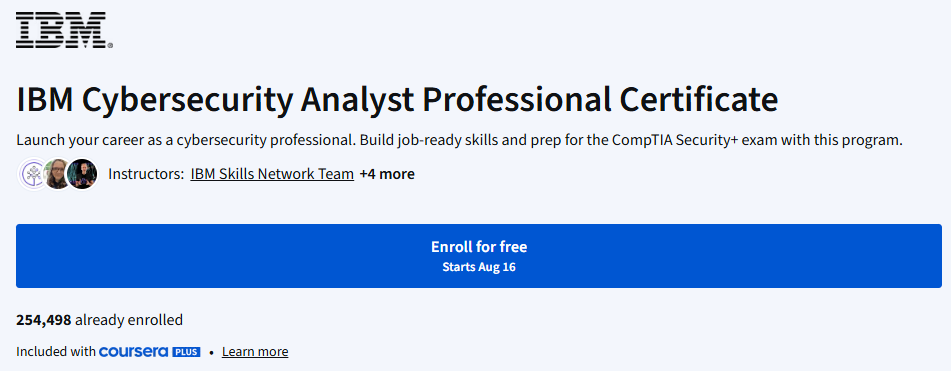
Source- Coursera
2. Google Project Management
| Course Duration | 6 months at 10 hours a week |
| Course Rating | 4.9/5 (121,715 reviews) |
| Taught By | Google Experts |
| Best For | Aspiring project managers |
| Certification | Google Professional Certificate |
Learn project management fundamentals, Agile methodology, and Scrum practices through interactive content. Gain skills in risk management, stakeholder communication, and strategic problem-solving. The best part is that this course also qualifies for 100+ hours of PMI education and direct job applications with Google partners.
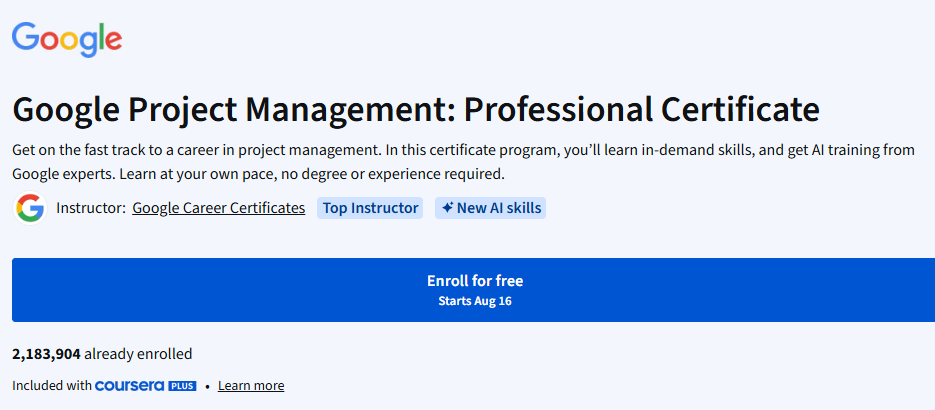
Source- Coursera
3. AI in Healthcare Specialization Course
| Course Duration | 4 weeks at 10 hours a week |
| Course Rating | 4.7/5 (2,199 reviews) |
| Taught By | Matthew Lungren (Stanford University) |
| Best For | Healthcare providers and computer science professionals |
| Certification | Stanford University |
If you want to learn AI applications in healthcare through hands-on projects, analyzing patient data, learn machine learning, clinical data management, and regulatory compliance, this course is for you. Features a capstone project following a patient’s journey using real healthcare datasets for practical experience.
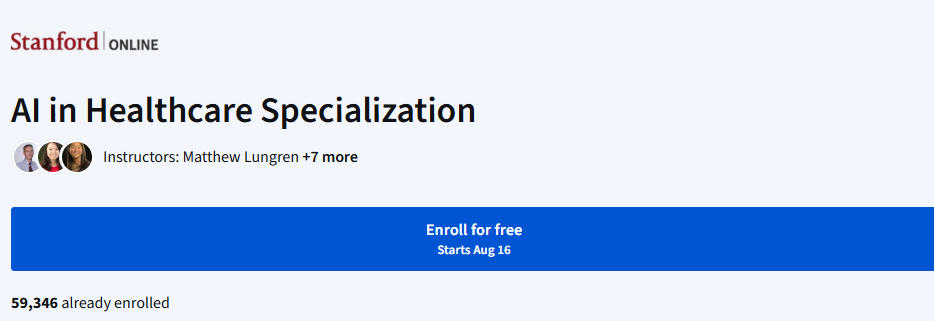
Source- Coursera
4. Data Science Foundations Specialization
| Course Duration | 3 months at 10 hours a week |
| Course Rating | 4.7/5 (296 reviews) |
| Taught By | Romeo Kienzler |
| Best For | Data science beginners |
| Certification | From University of London + IBM |
Build foundational data science skills with Python, R, SQL, and machine learning algorithms. Includes hands-on projects with GitHub, Jupyter Notebooks, and data visualization. Progress can transfer to the University of London’s BSc Computer Science degree program.

Source- Coursera
5. Business Foundations Specialization
| Course Duration | 2 months at 10 hours a week |
| Course Rating | 4.7/5 (18,929 reviews) |
| Taught By | Michael R Roberts |
| Best For | Business career changers and entrepreneurs |
| Certification | University of Pennsylvania |
Learn the core concepts related to business fundamentals across marketing, finance, accounting, and operations management. Learn financial statement analysis, branding strategies, and process improvement. Culminates in a capstone project developing go-to-market strategies for real business challenges.

Source- Coursera
Want a deeper insight into course quality, recognition, and accreditation? Check out our detailed Coursera review before enrolling.
Impact Of Non-Accredited Learning
Like many courses Coursera offers, non-accredited learning platforms provide avenues for skill enhancement and knowledge acquisition outside traditional accreditation systems.
Professional Development
Professional development is evolving, and non-accredited online courses play a significant role. For instance, employees and job seekers use platforms like Coursera to gain industry-relevant skills that might not be available at accredited institutions. Many of these courses are created with leading companies and universities, indicating quality and relevance to current industry standards.
Continuing Education
Individuals seeking to expand their knowledge base can benefit from non-accredited courses as they often offer the latest information on a subject. These courses can be especially vital for those in rapidly changing fields, such as technology or digital marketing, where staying updated is crucial. While these courses do not provide accredited degrees, they often issue certificates or badges that learners can display on their resumes or LinkedIn profiles.
Alternatives To Accreditation
In online education, there are recognized options for validating learning outside of traditional accreditation. These alternatives often provide focused skill verification and are valued by employers.
Credentialing Services
Credentialing services affirm a learner’s qualifications and expertise without going through traditional academic accreditation. These services might partner with industry leaders or use professional standards to grant credentials that prove proficiency in specific areas.
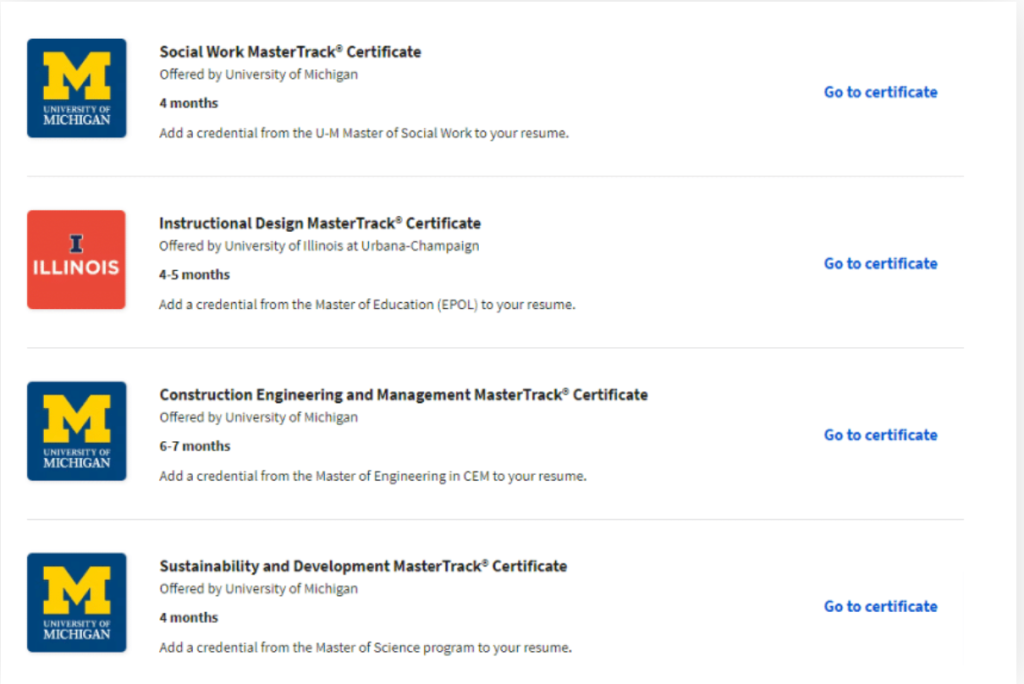
For instance, Coursera’s MasterTrack certificate programs are designed to authenticate specialized skills with immediate workplace applicability.
Micro-Credentials
Micro-credentials signify the completion of short, targeted educational programs to teach specific skills or competencies. Unlike traditional degree programs, they can be accrued to showcase expertise in a specific subject area or practical skill set.
Businesses increasingly acknowledge these by seeking evidence of continued professional development in potential hires. Examples include digital badges or certificates from online platforms, demonstrating that learners have acquired certain desirable skills in the job market.
For beginners still exploring whether Coursera is accredited or not, Coursera free courses are a great way to test the platform without cost.
More On Coursera:
Conclusion: Coursera Is Accredited & Certificates Hold Value.
Through its partnerships with top universities and organizations, Coursera is accredited.
While Coursera itself isn’t a degree-granting body, it provides access to Coursera-accredited programs, professional certificates, and degrees that hold real weight in academia and the workplace.
Additionally, Coursera certificates are widely respected, though recognition may vary by industry and country.
The platform offers flexible, accredited pathways for career growth. The bottom line is that Coursera accreditation is your gateway to trusted online learning. Start today!

